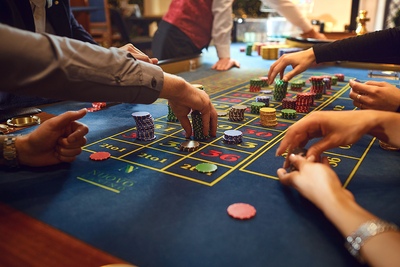 The desire to make a quick and easy buck will always exist and for some people gambling is the easiest way to attempt it. For all but a committed, highly intelligent and determined few who can make a success of professional gambling, playing casino games or betting on sports should be seen as a fun pastime rather than a way to make serious cash. It is not a reliable way to make that quick buck and, as the old adage goes, the best way to walk out of a casino with a small fortune is to walk in with a big one.
The desire to make a quick and easy buck will always exist and for some people gambling is the easiest way to attempt it. For all but a committed, highly intelligent and determined few who can make a success of professional gambling, playing casino games or betting on sports should be seen as a fun pastime rather than a way to make serious cash. It is not a reliable way to make that quick buck and, as the old adage goes, the best way to walk out of a casino with a small fortune is to walk in with a big one.
So, if you are asking “Do roulette systems work?” you may have already figured out that, sadly, our answer is going to be no. There are a plethora of websites and books that claim to offer the “Secret casinos don’t want you to know” or similar but, we’ll say it clearly, there are no roulette systems that work. We advise against trying to use them and we strongly advise against paying some unscrupulous person to tell you a secret that is nothing but a lie.
Before we look at the most famous system of them all we should draw a crucial distinction between what we would call a system and what we would call a strategy. There are strategies that can and do work, as we discuss in our articles on card counting for blackjack and wheel bias for roulette. Indeed, mathematician (and oddly also record producer) Gonzalo Garcia-Pelayo won over €1m exploiting wheel bias in a Madrid casino.
However, a strategy is a type of advantage play that not only erodes the house edge but actually creates an advantage for the player. This is a mathematical situation where, on average, the player can expect to get a net win more than they lose. In contrast, a “system”, at least how it is almost always applied to roulette, is instead just a variation on a staking plan. It tells you how much to bet and when but does nothing to improve the house edge.
We maintain that there is no system that works, if by system you mean a simple way of playing or staking that requires no skill. Whilst roulette is resolutely a game of chance in theory, as we explain in our feature on wheel bias the practice can sometimes be subtly different.
However, the skill needed to identify and exploit imperfect wheels, or to use the technique known as clocking, is far beyond a simple “system”. It takes real dedication, skill and practice and is not something you can just learn in an hour and then use to make a net win playing roulette.
Despite this, there are many who try to sell such systems and most of these are variations on the most famous – and most flawed – system of them all: Martingale.
The Martingale System And Roulette

Whilst the Martingale system can be used for just about any form of gambling it is best suited to, and most commonly associated with, roulette. Whilst many who hear about it, or who believe they themselves “discovered” it, think it is a fool proof “system”, in fact the Martingale system is really nothing more than a staking plan.
A staking plan tells a punter how much they should wager on a given bet based on other information. This may be the perceived value of the bet in sports betting (or in all forms of gambling), the outcome of your last bet, how past results have fallen, or how much of your bank remains.
Martingale is one of a number of negative progression systems whereby you increase your stake (the progression) after a losing bet (a negative outcome). In the case of Martingale you place your roulette bet on any of the even money bets, for example red or black. After each winning bet you place a bet of the same size and after every losing bet you double your stake. The theory and logic behind this is that no matter how long a losing streak you experience, as soon as you land a winning bet you will return to a net win of one unit.
Let us assume a £1 bet on black each time. If you win, you pocket your £1 and bet £1 again. You make a lucky start and win again (and remember this is luck, as each spin of the roulette wheel is entirely random and unpredictable unless you are using some form of more advanced strategy, technique or (illegal) equipment). You pocket your net win and bet again but this time you lose. Under Martingale you simply double your stake to £2, and if you win you instantly return to a net win as the doubled stake covers your previous loss and a single unit (£1) net win, as well.
| Stake | Outcome of Bet | Net win or Loss | Running P/L |
|---|---|---|---|
| £1 | Loss | -£1 | -£1 |
| £2 | Loss | -£2 | -£3 |
| £4 | Loss | -£4 | -£7 |
| £8 | Loss | -£8 | -£15 |
| £16 | Loss | -£16 | -£31 |
| £32 | Loss | -£32 | -£63 |
| £64 | Loss | -£64 | -£127 |
| £128 | Win | +£128 | +£1 |
The table above illustrates that even if you lose your first seven spins at the table, your win on the eighth round returns you instantly to a net win. Martingale is so seductive because it is so simple and, in theory, the logic is correct.
Let us assume you stick to betting on black each time. Many who play roulette would feel that the above sequence, seven reds in a row (or, crucially as it happens, seven reds or zeroes), is incredibly unlikely. But the “magic” of Martingale means that even such a streak is not a problem and one black means you are back in the, well, black.
Why Martingale Fails

Martingale is not a system you should ever use because it does nothing to alter the fact that the existence of the zero means you are being paid odds of evens but your chances of winning are worse than 50%. A good system, or staking plan, cannot change bad value. Martingale feels like a clever trick that means you cannot lose but you can… and you will.
Unless you have an infinite bank balance, infinite time and a casino with no maximum bet then Martingale is doomed to failure. As those conditions do not exist, even Jeff Bezos does not have limitless funds, so the Martingale system doesn’t work long term.
Quite simply, at some stage you will hit a very long streak of losses and this will mean that you either run out of cash or, if you happen to be incredibly rich, hit the casino’s maximum stake limit. In our example above you are risking £128 on the final spin to win just £1 and if you lose, which you have more than a 51% chance of doing, you will be £255 down. Now let us consider a slightly longer run of losses with a more realistic red/black stake size of £5.
| Stake | Outcome of Bet | net win or Loss | Running P/L |
|---|---|---|---|
| £5 | Loss | -£5 | -£5 |
| £10 | Loss | -£10 | -£15 |
| £20 | Loss | -£20 | -£35 |
| £40 | Loss | -£40 | -£75 |
| £80 | Loss | -£80 | -£155 |
| £160 | Loss | -£160 | -£310 |
| £320 | Loss | -£320 | -£635 |
| £640 | Loss | -£640 | -£1275 |
| £1280 | Loss | -£1280 | -£2555 |
| £2560 | Loss | -£2560 | -£5115 |
| £5120 | Loss | -£5120 | -£10235 |
As you can see, after 10 consecutive losses your next stake is £5,120. If it wins, great, you have won £5. But if it loses you are more than £10k down. Do you want to be staking more than £5,000 to win £5 with a 48% chance of success?
Those who still argue that Martingale works will claim that the chances of such a long losing streak are incredibly small. They are right. If you started playing online roulette right this very second then the odds of hitting 10 non-black numbers in a row are incredibly slim, about one in 784 in fact. But the Martingale system is designed to be used over an extended period of time and the longer you stay at the table, the more likely such a bad run becomes.
Believe it or not, the longest run of consecutive reds ever recorded in a casino was 32 and if you ask any croupier who has been doing the job a while they will tell you that runs of 10 or more losing black bets in a row are common. If they spin the wheel 60 times an hour, which is fairly typical, they would spin the wheel 2,400 times in a 40-hour working week. That means they are seeing streaks that Martingale advocates claim are incredibly rare three or four times every week!
Quite simply, Martingale is a system you should avoid. No staking plan or betting system changes the house edge of roulette (2.7% for the single zero version). No matter how you structure your bets, the casino will expect to win about 2.7% of stakes. All that Martingale does is change the variance, meaning rather than lots of small wins intermingled with lots of small losses, you will get lots and lots of small wins followed by one devastating ‘you’ll-wish-you-had-listened-to-us’ loss.
 Let us consider two friends, Steady Eddie and Marty McMartingaleface, who both go to the casino and both play roulette together. Steady Eddie stakes £5 on red every spin, whilst Marty uses the Martingale system and bets on black, starting with a £5 bet. They go to the casino for two hours every week for 50 years, like lifelong roulette buddies (is there a film in this?) and on their 50-year anniversary they look back at their results.
Let us consider two friends, Steady Eddie and Marty McMartingaleface, who both go to the casino and both play roulette together. Steady Eddie stakes £5 on red every spin, whilst Marty uses the Martingale system and bets on black, starting with a £5 bet. They go to the casino for two hours every week for 50 years, like lifelong roulette buddies (is there a film in this?) and on their 50-year anniversary they look back at their results.
Chances are both will have lost almost exactly the same amount – about 2.7% of their stakes. Steady Eddie probably lost around £16 per session, sometimes a little more, sometimes making a nice net win when his luck was in. In contrast, Marty McMartingaleface probably made a net win most weeks, albeit with some scares along the way when he was betting hundreds of pounds to pocket just £5.
However, over the course of those 2,607 weeks, Marty would have had some very bad, sad and dark times. Subject to his bankroll permitting it, there will have been times when he lost thousands of pounds and left the casino a four- or even five-figure sum down.
Unless you are prepared to accept the occasional huge loss in order to gain frequent small wins, Martingale, we’ll say it again and again, is a very bad idea.
What About Other Systems?

There are many similar and usually related systems that you may see touted, either on unscrupulous casino sites or by friends who have yet to hit their inevitable bad streak. There are almost countless Martingale variants, as well as other forms of staking plan but once again, unless they address the house edge, they are doomed to failure.
One such idea is the Grand Martingale (or Great Martingale), where you not only double your stake after a loss but add an additional unit as well. The theory behind this is that should you hit a bad sequence and end up risking a large sum, there is some compensation in that when you do eventually win your overall net win will be bigger than simply one staking unit. The reality, however, is just that when you hit the inevitable catastrophic losing streak, your losses are greater.
Leaving Martingale aside, some talk instead about positive progression systems, where you increase your stake after a winning (rather than losing) spin. The theory is that you should reduce your stake after a loss too, meaning that when you hit a good streak you maximise your net wins, whilst a bad run of losses has minimal impact on your balance. Once again, such tactics sound good in theory but do absolutely nothing to address the house edge.
Other systems combine elements of two flawed ideas into one, such as schemes that combine Martingale with the idea that spins that have gone before have an impact on what is to come. Whilst extended and detailed analysis of past spins may help you uncover wheel bias or a croupier’s “signature”, short-term consideration of past spins is entirely pointless, as we explain in more detail in our feature on the Gambler’s Fallacy.
Despite this, some systems may advocate betting on red/black but only after three of the other colour have hit in succession (the number is irrelevant and the odds of black on the next spin are the same whether the last spin was red, black or zero, or whether the last 15 spins have been red). If you win, wait for another sequence of three and then back the other colour or if you lose, once again wait but, as per standard Martingale, double your bet.
As well as the problems of Martingale, this system ignores the fact that the wheel has no memory. Our intuition (and various mathematical theories that have been disproved) suggest that if there are, for example, 10 reds in a row, a black is more likely to come up next. This is just plain wrong, the chances are exactly the same on every spin, so any attempt to use such logic as the basis for a roulette system is as doomed as the Martingale.
